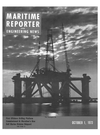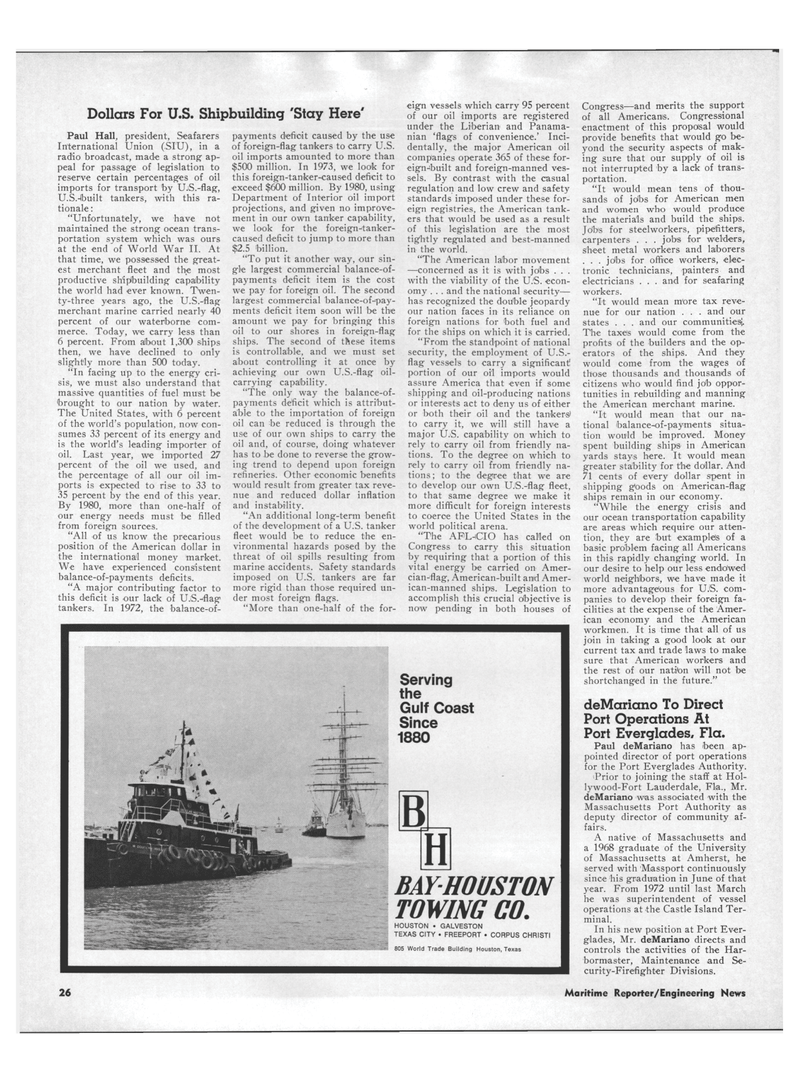
Page 24: of Maritime Reporter Magazine (October 1973)
Read this page in Pdf, Flash or Html5 edition of October 1973 Maritime Reporter Magazine
Dollars For U.S. Shipbuilding 'Stay Here'
Paul Hall, president, Seafarers
International Union (SIU), in a radio broadcast, made a strong ap- peal for passage of legislation to reserve certain percentages of oil imports for transport by U.S.-flag,
U.S.-Jbuilt tankers, with this ra- tionale : "Unfortunately, we have not maintained the strong ocean trans- portation system which was ours at the end of World War II. At that time, we possessed the great- est merchant fleet and the most productive shipbuilding capability the world had ever known. Twen- ty-three years ago, the U.S.-flag merchant marine carried nearly 40 percent of our waterborne com- merce. Today, we carry less than 6 percent. From albout 1,300 ships then, we have declined to only slightly more than 500 today. "In facing Up to the energy cri- sis, we must also understand that massive quantities of fuel must be 'brought to our nation by water.
The United States, with 6 percent of the world's population, now con- sumes 33 percent of its energy and is the world's leading importer of oil. Last year, we imported 27 percent of the oil we used, and the percentage of all our oil im- ports is expected to rise to 33 to 35 percent by the end of this year.
By 1980, more than one-half of our energy needs must be filled from foreign sources. "All of us know the precarious position of the American dollar in the international money market.
We have experienced consistent balance-of-payments deficits. "A major contributing factor to this deficit is our lack of U.S.-flag tankers. In 1972, the balance-of- payments deficit caused by the use of foreign-flag tankers to carry U.S. oil imports amounted to more than $500 million. In 1973, we look for this foreign-tanker-caused deficit to exceed $600 million. By 1980, using
Department of Interior oil import projections, and given no improve- ment in our own tanker capability, we look for the foreign-tanker- caused deficit to jump to more than $2.5 billion. "To put it another way, our sin- gle largest commercial balance-of- payments deficit item is the cost we pay for foreign oil. The second largest commercial balance-of-pay- ments deficit item soon will be the amount we pay for bringing this oil to our shores in foreign-flag ships. The second of these items is controllable, and we must set about controlling it at once by achieving our own U.S.-flag oil- carrying capability. "The only way the balance-of- payments deficit which is attribut- able to the importation of foreign oil can be reduced is through the use of our own ships to carry the oil and, of course, doing whatever has to be done to reverse the grow- ing trend to depend upon foreign refineries. Other economic benefits would result from greater tax reve- nue and reduced dollar inflation and instability. "An additional long-term benefit of the development of a U.S. tanker fleet would be to reduce the en- vironmental hazards posed by the threat of oil spills resulting from marine accidents. Safety standards imposed on U.S. tankers are far more rigid than those required un- der most foreign flags. "More than one-half of the for- eign vessels which carry 95 percent of our oil imports are registered under the Liberian and Panama- nian 'flags of convenience.' Inci- dentally, the major American oil companies operate 365 of these for- eign-built and foreign-manned ves- sels. By contrast with the casual regulation and low crew and safety standards imposed under these for- eign registries, the American tank- ers that would be used as a result of this legislation are the most tightly regulated and best-manned in the world. "The American labor movement —concerned as it is with jobs . . . with the viability of the U.S. econ- omy . .. and the national security— has recognized the double jeopardy our nation faces in its reliance on foreign nations for both fuel and for the ships on which it is carried. "From the standpoint of national security, the employment of U.S.- flag vessels to carry a significant! portion of our oil imports would assure America that even if some shipping and oil-producing nations or interests act to deny us of either or both their oil and the tankers' to carry it, we will still have a major U.S. capability on which to rely to carry oil from friendly na- tions. To the degree on which to rely to carry oil from friendly na- tions; to the degree that we are to develop our own U.S.-flag fleet, to that same degree we make it more difficult for foreign interests to coerce the United States in the world political arena. "The AFL-iCIO has called on
Congress to carry this situation by requiring that a portion of this vital energy be carried on Amer- cian-flag, American-built and Amer- ican-manned ships. Legislation to accomplish this crucial objective is now pending in both houses of
Congress—and merits the support of all Americans. Congressional enactment of this proposal would provide benefits that would go be- yond the security aspects of mak- ing sure that our supply of oil is not interrupted by a lack of trans- portation. "It would mean tens of thou- sands of jobs for American men and women who would produce the materials and build the ships.
Jdbs for steelworkers, pipefitters, carpenters . . . jobs for welders, sheet metal workers and laborers . . . jdbs for office workers, elec- tronic technicians, painters and electricians . . . and for seafaring workers. "It would mean more tax reve- nue for our nation . . . and our states . . . and our communities!.
The taxes would come from the profits of the builders and the op- erators of the ships. And they would come from the wages of those thousands and thousands of citizens who would find job oppor- tunities in rebuilding and manning the American merchant marine. "It would mean that our na- tional balance-of-payments situa- tion would be improved. Money spent building ships in American yards stays here. It would mean greater stability for the dollar. And 71 cents of every dollar spent in shipping goods on American-flag ships remain in our economy. "While the energy crisis and our ocean transportation capability are areas which require our atten- tion, they are but exampleis of a basic problem facing all Americans in this rapidly changing world. In our desire to help our less endowed world neighbors, we have made it more advantageous for U.S. com- panies to develop their foreign fa- cilities at the expense of the Amer- ican economy and the American workmen. It is time that all of us join in taking a good look at our current tax and trade laws to make sure that American workers and the rest of our natiton will not be shortchanged in the future." deMariano To Direct
Port Operations At
Port Everglades, Fla.
Paul deMariano has been ap- pointed director of port operations for the Port Everglades Authority.
Prior to joining the staff at Hol- lywood-Fort Lauderdale, Fla., Mr. deMariano was associated with the
Massachusetts Port Authority as deputy director of community af- fairs.
A native of Massachusetts and a 1968 graduate of the University of Massachusetts at Amherst, he served with 'Massport continuously since his graduation in June of that year. From 1972 until last March he was superintendent of vessel operations at the Castle Island Ter- minal.
In his new position at Port Ever- glades, Mr. deMariano directs and controls the activities of the Har- bormaster, Maintenance and Se- curity-Firefighter Divisions.
Serving the
Gulf Coast
Since 1880
BJ_
H
BAY-HOUSTON
TOWING CO.
HOUSTON • GALVESTON
TEXAS CITY • FREEPORT • CORPUS CHRISTI 805 World Trade Building Houston, Texas 26 Maritime Reporter/Engineering News

 23
23

 25
25
